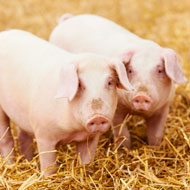
Database created to capture information and fight the disease
A contingency plan for the pig industry, to be activated should Porcine Epidemic Diarrhoea (PEDv) reach the UK, has now been completed, the British Pig Executive (BPEX) has announced.
A database is being created so if the disease does hit the UK, information can be captured and used to fight it. This ties-in with a questionnaire, which will be asking about the type of farming system and the outbreak of the disease.
The organisation say that although the plan has been finished, it is a living document and will change as the situation changes.
BPEX veterinary team manager, Martin Smith, said: “This will be vital in gathering the information we need for the epidemiology of PEDv and how it behaves under different conditions.
“We also have some standard procedures which are in the pipeline and are due to be published in the next couple of months. They will probably be published as individual sheets because they too will change according to the conditions.”
PEDv has killed over 10 per cent of the US pig population in just two years, causing up to 100 per cent mortality. The Asian-American strain is so deadly that just a thimbleful of manure from an infected pig unit would be enough to infect the whole of the UK's pig population.
The disease reached the borders of Europe late in 2014 and British vets are concerned that the virus could easily spread to the European Union.
A disease charter, based on that created for swine dysentery, has been completed and this will be available online as part of the Pig Hub.
Martin added: “Producers will sign in and register as part of the Charter so information gathered can be used to combat the disease and notify producers of outbreaks occurring near them."
Phase two, which BPEX hopes to be ready by late Spring, will link the Charter to vets, feed companies and the allied industry, so they are aware that one of the units in an area has a problem.
Funded by BPEX, the diagnostic testing is already in place and this is being extended to any diarrhoea sample so they will be routinely checked for PEDv.
Martin said: “In the early stages it can be difficult to diagnose PEDv as it is similar to a number of other diseases. We have achieved a lot in quite a short time but there is still much more to be done. All this work will be valuable in fighting all exotic and emerging disease, not just PEDv.”



 HMRC has invited feedback to its communications regarding the employment status of locum vets and vet nurses.
HMRC has invited feedback to its communications regarding the employment status of locum vets and vet nurses.